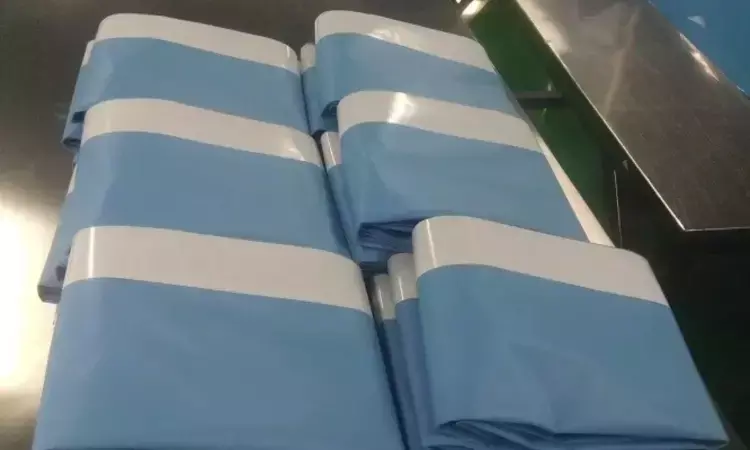- Home
- Medical news & Guidelines
- Anesthesiology
- Cardiology and CTVS
- Critical Care
- Dentistry
- Dermatology
- Diabetes and Endocrinology
- ENT
- Gastroenterology
- Medicine
- Nephrology
- Neurology
- Obstretics-Gynaecology
- Oncology
- Ophthalmology
- Orthopaedics
- Pediatrics-Neonatology
- Psychiatry
- Pulmonology
- Radiology
- Surgery
- Urology
- Laboratory Medicine
- Diet
- Nursing
- Paramedical
- Physiotherapy
- Health news
- Fact Check
- Bone Health Fact Check
- Brain Health Fact Check
- Cancer Related Fact Check
- Child Care Fact Check
- Dental and oral health fact check
- Diabetes and metabolic health fact check
- Diet and Nutrition Fact Check
- Eye and ENT Care Fact Check
- Fitness fact check
- Gut health fact check
- Heart health fact check
- Kidney health fact check
- Medical education fact check
- Men's health fact check
- Respiratory fact check
- Skin and hair care fact check
- Vaccine and Immunization fact check
- Women's health fact check
- AYUSH
- State News
- Andaman and Nicobar Islands
- Andhra Pradesh
- Arunachal Pradesh
- Assam
- Bihar
- Chandigarh
- Chattisgarh
- Dadra and Nagar Haveli
- Daman and Diu
- Delhi
- Goa
- Gujarat
- Haryana
- Himachal Pradesh
- Jammu & Kashmir
- Jharkhand
- Karnataka
- Kerala
- Ladakh
- Lakshadweep
- Madhya Pradesh
- Maharashtra
- Manipur
- Meghalaya
- Mizoram
- Nagaland
- Odisha
- Puducherry
- Punjab
- Rajasthan
- Sikkim
- Tamil Nadu
- Telangana
- Tripura
- Uttar Pradesh
- Uttrakhand
- West Bengal
- Medical Education
- Industry
Adhesive drapes reduce risk of wound contamination during orthopedic surgery: Study

Canada: Findings from a recent review in the journal Clinical Orthopaedics and Related Research suggest that adhesive drapes decrease the risk of postoperative wound contamination during orthopedic surgeries. Moreover, there is an increased risk of wound contamination with the use of adhesive drapes in situations where drape adhesion is compromised and peel back occurs at the wound edge.
The researchers further write that the best currently available evidence is indeterminate as to the effect of adhesive drapes on the risk of surgical site infections, however, if used, care should be taken to avoid or minimize drape peel back.
The use of adhesive surgical drapes is meant to reduce the rates of surgical site infection. Despite that, international surgical guidelines have recommended against the use of such drapes however, this is primarily based on non-orthopedic evidence. Based on this, Raman Mundi, University of Toronto, Toronto, Ontario, Canada, and colleagues aimed to address the following questions: -- 1) does the use of adhesive drapes decrease the risk of wound contamination? (2) Does intraoperative drape peeling (intentional or inadvertent) increase the risk of wound contamination? (3) Does the use of adhesive drapes decrease the risk of surgical site infection?
For this purpose, the researchers searched the online databases for controlled trials (RCTs) published since 2000 and compared adhesive drapes with controls. All databases were searched from inception to March 1, 2021. From among 417 search results, five eligible RCTs were identified and included. There were a total of 2266 patients, with 1129 (49.8%) in the adhesive drape groups, and 1137 (50.2%) in the control groups.
The studies included hip and knee surgery trials (n = 3 trials; 1020 patients in intervention groups and 1032 patients in control groups) as well as trials on shoulder arthroscopy (n = 1 trial; 65 patients in the intervention group and 61 patients in the control group) and lumbar spine surgery (n = 1 trial; 44 patients in each group).
Key findings include:
- Based on data from pooled wound swab culture results from four studies, a reduction in wound contamination was associated with the use of adhesive drapes (odds ratio 0.49).
- The available evidence was inconclusive to determine whether intraoperative drape peeling (intentional or inadvertent) influenced the risk of wound contamination.
- Three studies did not report on this outcome, one study found an increased infection rate with drape peel back, and another study found a reduced treatment effect of adhesive drapes when peel back occurred in a subgroup analysis.
- The two studies that analyzed surgical site infections reported no infections in either arm; therefore, the authors could not answer the question of whether adhesive drapes affect the risk of surgical site infection.
"The findings of this review suggest that adhesive drapes, including those with antimicrobial properties, decrease the risk of wound contamination during orthopedic procedures," the authors wrote.
"The best currently available evidence is indeterminate as to the effect of adhesive drapes on the risk of surgical site infections; however, if used, care should be taken to avoid or minimize drape peel back," they concluded.
Reference:
Mundi, Raman MD, MSc1; Nucci, Nicholas MSc (PT)2; Ekhtiari, Seper MD, MSc3; Wolfstadt, Jesse MD, MSc4; Ravi, Bheeshma MD, PhD, FRCSC1; Chaudhry, Harman MD, MSc, FRCSC1 Do Adhesive Drapes Have an Effect on Infection Rates in Orthopaedic Surgery? A Systematic Review and Meta-Analysis, Clinical Orthopaedics and Related Research: September 7, 2021 - Volume - Issue - 10.1097/CORR.0000000000001958 doi: 10.1097/CORR.0000000000001958
Dr Kamal Kant Kohli-MBBS, DTCD- a chest specialist with more than 30 years of practice and a flair for writing clinical articles, Dr Kamal Kant Kohli joined Medical Dialogues as a Chief Editor of Medical News. Besides writing articles, as an editor, he proofreads and verifies all the medical content published on Medical Dialogues including those coming from journals, studies,medical conferences,guidelines etc. Email: drkohli@medicaldialogues.in. Contact no. 011-43720751


